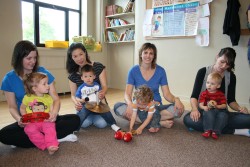More than 100 children and their parents come to Trinity Lutheran to move and groove…affirming the benefits of a musical education and the true value of play.
Childhood, like music, is a creative process. Sights, sounds and movement are all layers of a child’s imagination and development. Those elements are just what Marie Dicke, who started the Kindermusik program at Trinity Lutheran Church nearly ten years ago, hopes to instill in the classes she teaches.
“Kindermusik helps development of the brain through music,” Dicke explains. “There are lots of studies that show music prepares the brain for more difficult academic things later, like math and science.”
This marriage of music and learning got its start half a century ago, when German education experts created a curriculum with studies from renowned musicians and teachers in mind. Today, age-appropriate instruments, toys, stories and songs blend together in a program that is as much kinesthetic as it is auditory.
“Movement is just as important for learning as the music is for the children,” Dicke says. “They also explore different instruments and different kinds of music from all over the world.”
In 2003, Dicke set out to bring that kind of sensory education to Peoria’s Trinity Lutheran Church. “Before moving here, we were in Iowa City,” she says. “I was a nanny, and I took the children to Kindermusik there. It was a great program, so I decided to get my certificate.”
Since its inception, Trinity’s program has grown to a staff of four teachers, with about 100 children enrolled each semester. And there are takeaway lessons for the parents and grandparents as well.
 “It’s enjoyable to watch the adults interact with their children—to see that kind of bonding. There’s a lot of education I can give the parents, too,” Dicke says. “Especially for first-time parents, it gives them a special way to bond with their baby.”
“It’s enjoyable to watch the adults interact with their children—to see that kind of bonding. There’s a lot of education I can give the parents, too,” Dicke says. “Especially for first-time parents, it gives them a special way to bond with their baby.”
Dicke says the classes offer parents additional tools to help their children want to learn, and they aid in making life’s daily rituals more relaxed through music. Every class and activity is planned with a specific age group in mind, from newborns to seven-year-olds. But even before birth, babies are already a wealth of new knowledge and brain growth. That, she explains, is why music is such a rich source of information for young minds.
“The classes help to create new neural pathways,” she explains. “They get the brain to experience lots of different things. We like working with loud and soft sounds, high and low—contrasts like that—to help them learn opposites.” Learning in a community gives the children an opportunity to socialize and expand their vocabulary and self-esteem.
Every child comes in with their own personality, Dicke says, but even the shyest among them enjoys coming to class after consistent visits. The overall goal is to make learning enjoyable, and that means attaching a skill or lesson to a positive emotion.
“When people learn, the memory sticks when there’s an emotion involved,” Dicke says. “We try to associate the learning with laughter and fun.”
As the Trinity Lutheran Kindermusik program prepares to celebrate a decade of that kind of playful learning, Dicke points out that teaching has given her something, too: fulfillment. “It has been emotionally rewarding,” she says. a&s


